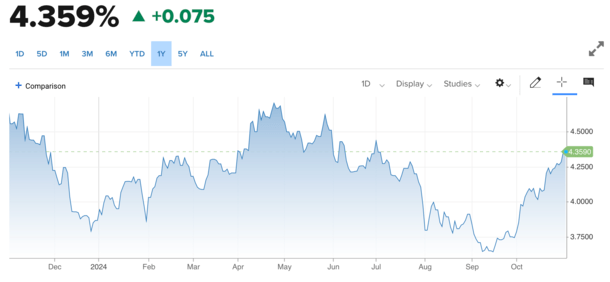It now seems pretty clear that what economic data emerges between now and next week won’t matter.
Mortgage rates are not going to improve significantly this week or before the election.
Too bad for those who have to block their prices and/or close this week. And last month for that matter.
Lenders are essentially in a holding pattern and continue to price defensively until at least next Wednesday. Probably longer…
Simply put, the election outcome currently matters more than the data.
The biggest presidential election in years
We all know that next week’s presidential election will be important. One of the biggest in years. In addition to being very controversial, the stakes are high regarding the direction of the economy.
So far, markets have priced in a Trump victory, at least defensively.
Without getting political here (I never care), it doesn’t appear that either winning candidate is helping 10-year bond yields at the moment.
The best way to track mortgage rates is to use the 10-year bond yield, which works well historically because 30-year fixed-rate mortgages often last about a decade as well.
Although they are offered for 30 years, most are paid off sooner due to refinancing or selling a home.
Lately, the 10-year yield has been climbing higher and higher, with most market experts pointing the finger at increased government spending.
Long story short, with more government spending expected, any way you slice it, returns have increased. Investors want to be compensated when they buy public debt (bonds).
But one could argue that this was already known several months ago, when yields were closer to 3.50% compared to around 4.35% today. What gives?
Bond yields are higher because the worst of everything is priced in

Without getting too technical here, bond yields have essentially priced in the worst of everything lately. Just look at the table above of CNBC.
Whether it’s the election outcome, possible government spending, economic data, everything is priced in the worst way possible.
That’s why we’ve seen the 10-year yield rise nearly a percentage point since the Fed cut rates in mid-September.
And despite a very weak employment report this morningthe 10-year yield further increased by around 6 basis points.
Yes, this was a report affected by hurricanes and strikes, but on a normal first Friday of the month you would likely see yields fall and mortgage rates improve given the immense weakness.
That’s not going to happen this week and it’s not really a surprise at this point. As we noted, investors have bigger concerns on their minds.
The good news is that we should have clarity next week, once the votes are tallied, and we hope to have a clear winner.
Of course, if things drag on, that could also hurt bond yields. Essentially, anything and everything right now is bad for bond yields, and therefore mortgage rates.
(How do presidential elections affect mortgage rates?)
Mortgage rates could see a rise in relief
Now the good news. Since there has been absolutely no good news for about a month and a half, a significant increase in mortgage rates could be on the cards.
As with any other trend, once it runs out of steam, a reversal could occur. Think of a stock market liquidation. Or a short press.
After a few bad days or weeks in the market, stocks often rebound. The same could be true for bonds, which have been battered for over a month now.
Eventually, they are oversold and there is a buying opportunity.
If bond prices do indeed rise once this election is decided, simply because clarity has finally been obtained, bond yields could fall quickly.
Defensive trading may ease and mortgage rates may finally see some relief.
It’s never a guarantee, but given that virtually everything has worked against mortgage rates for over a month, they could score a big win as soon as next week.
Of course, economic data will continue to be important. But above all, it will still count after being essentially sidelined during election season.
Remember, weak economic data is generally good for mortgage rates. So if unemployment continues to rise and inflation continues to fall, rates should also fall over time.
Continue reading: Mortgage lenders are taking their time to lower rates
(photo: Paul Sableman)